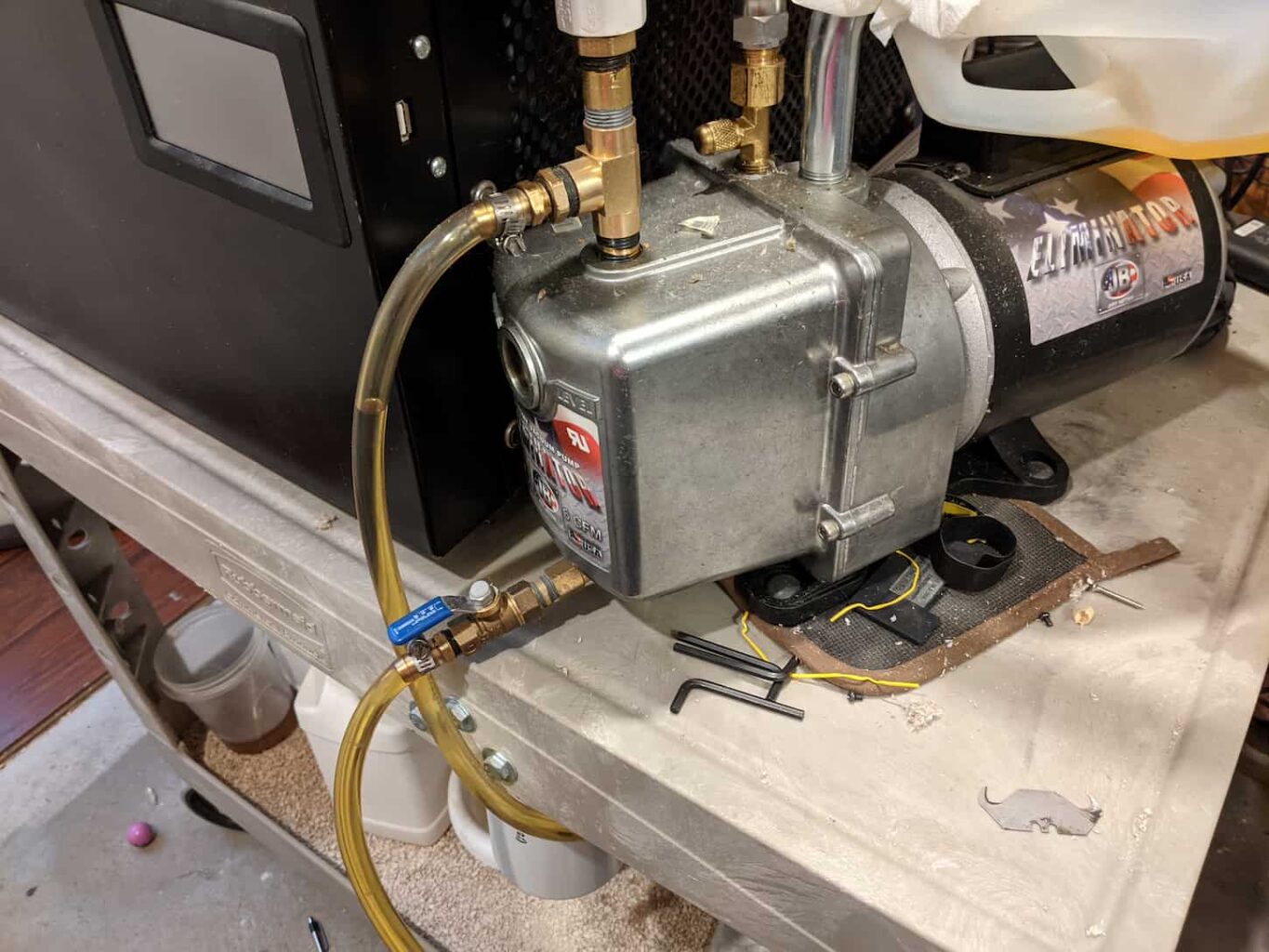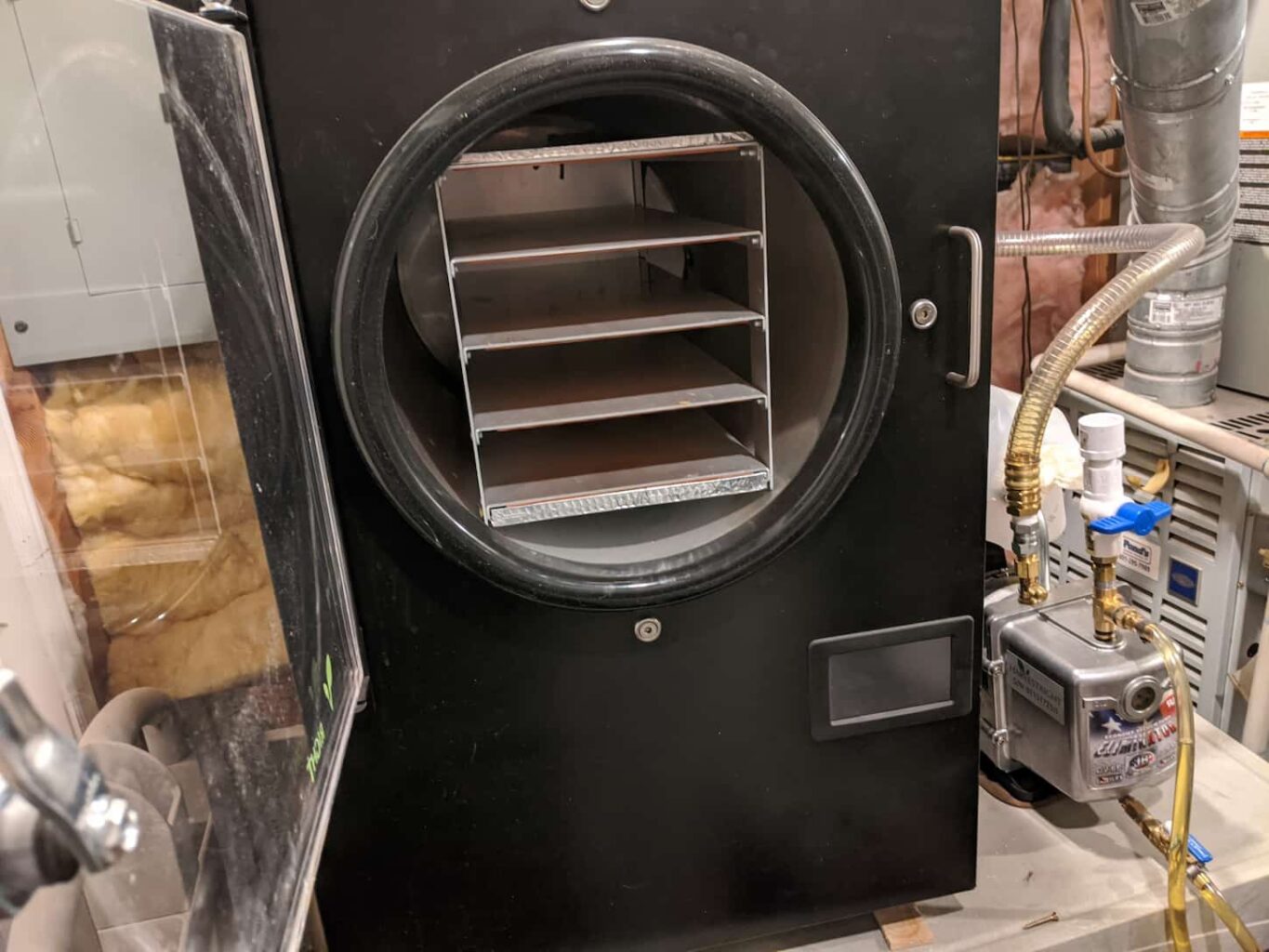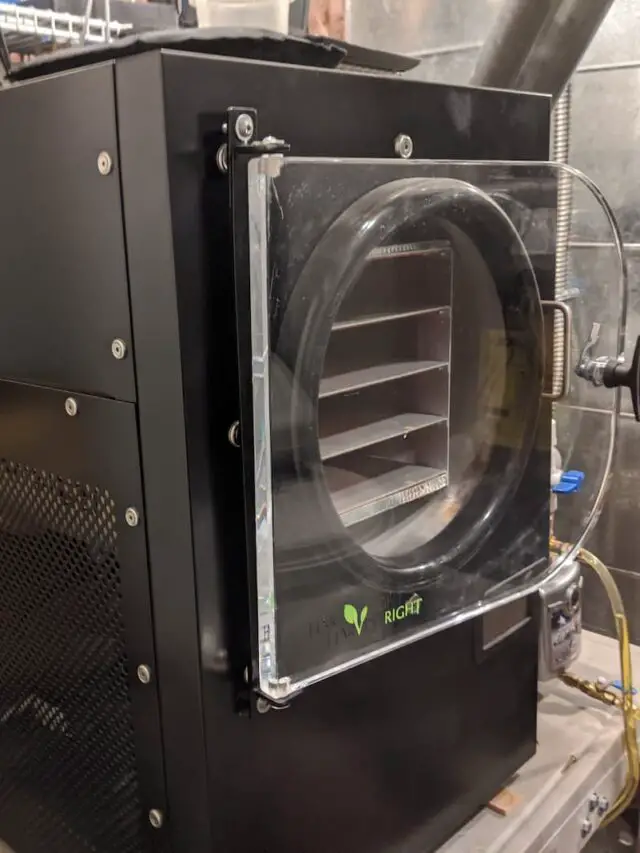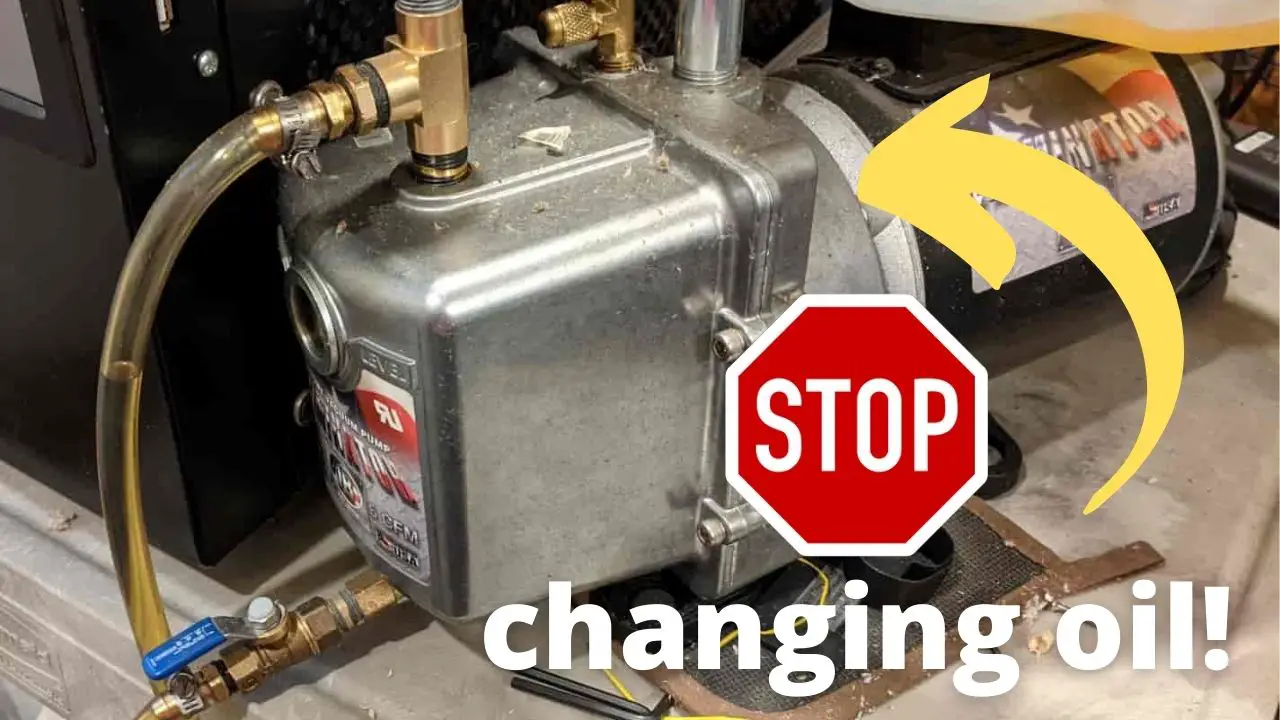Just like other machines, freeze-dryers require maintenance to keep everything running smoothly. This will keep your machine in tip-top condition and mean that ultimately it lasts longer! The vacuum pump of your freeze dryer is one part that needs particular attention. Without this part, your machine will be completely unable to work.
One of the most important ways to look after your freeze-dryer is to keep it in use. If you have an oil-based pump, you will need to change the oil regularly, and before it turns dark brown. Oil-free vacuum pumps do not need an oil change.
If you want to find out more about how to keep your vacuum pump in great shape, you’ve come to the right place! Read on to find out all about both oil-based and oil-free vacuum pumps, their pros and cons, and how to look after them once you’ve got one.
Here from YouTube and just want the parts list? Skip ahead to it by clicking here.

What Is a Freeze-Dryer Vacuum Pump?
Freeze-dryer vacuum pumps are used to extract water vapor from the freeze-dryer. They are crucial to the freeze-drying process.
Without a vacuum pump, your freeze-drier won’t work at all. However, it’s the most easily replaced part of the machine, and choosing a different pump can have several benefits such as being quieter, more efficient, or less messy.
There are two broad types of vacuum pumps that can be used with freeze-dryers. These are the oil-based vacuum pump and the oil-free vacuum pump. Different models of each type work in slightly different ways, but here’s a brief summary of what distinguishes them!
Oil-Based Vacuum Pumps
Oil-based vacuum pumps are the default, as the oldest designs and the cheapest designs to produce. This is likely the type of pump that is provided with your dryer as standard.
Oil-based vacuum pumps work by taking air from the freeze-dryer and compressing it into another sealed chamber. From here, the air is released out of the system. These pumps use the oil to help create the tight seals that are necessary to compress the air well.
Inside the pump, the oil has other functions too; it is a lubricant for the moving parts and helps absorb some heat to keep the pump a little cooler.
Oil-Free Freeze Dryer Vacuum Pump
Although oil-based vacuum pumps are the default, developments in technology have allowed us to use oil-free vacuum pumps too! These are generally more efficient than oil-based pumps, so are quieter and more eco-friendly, but also come with a higher price tag.
The main benefit of an oil-free vacuum pump is the lack of maintenance that you have to do. Oil-free pumps are unsuitable in certain circumstances (for example when the extracted gas is corrosive to metal), but as we’re just removing water vapor from the freeze dryer it’s a handy tool that’ll save you effort in the long run…
Read on for a breakdown of the key differences between oil-based and oil-free vacuum pumps!
Differences Between an Oil-Based and Oil-Free Freeze Dryer Vacuum Pump.
Although the biggest difference is whether they use oil (as you might have guessed from the name…) there are quite a few differences between oil-based and oil-free vacuum pumps. Here’s a comparison of some of the most important ones!
| Oil Freeze Dryer Vacuum Pump | Oil-Free Freeze Dryer Vacuum Pump |
|---|---|
| Generally provided with the freeze-dryer | You will need to buy one yourself to attach to the dryer |
| The oil needs to be filtered and drained at least every 4 to 5 batches | There’s no oil to be changed. |
| Sound runs at around 64 decibels | The sound runs at 62 decibels (so slightly quieter) |
| Requires regular maintenance | Doesn’t need any attention! |
| It is not as expensive as the oil-free freeze dryer vacuum pump | More expensive than the oil-based pump |
| It requires high energy consumption for freeze-drying | Requires less energy consumption for freeze-drying (so potentially an investment in the long run if you plan to use it a lot) |

How Much Do Oil-Free and Oil Vacuum Pumps Cost?
The price of vacuum pumps varies, but the average price of an oil vacuum pump is $700, while the average cost of an oil-free vacuum pump is $2000.
This is just an average, as the price of each type of pump varies quite a bit depending on the brand and model of the pump you choose to go for.
Cost of Oil-Based Vacuum Pumps
Oil-based vacuum pumps typically come with a freeze-dryer but can be changed if you need to. They are cheaper than oil-free vacuum pumps, coming in somewhere between $590-$1600.
I personally like the Harvest Right vacuum pumps (as this is the same brand as my freeze-dryer). You can check out this type of pump here (insert affiliate link to harvest right).
Cost of Oil-Free Vacuum Pump
Oil-free vacuum pumps don’t generally come with a freeze-dryer as standard, but you can choose to add one if you like. They are more expensive oil-based vacuum pumps, in the range of $1500-$2700.
You can find out more info about the Harvest Right oil-free vacuum pump here.
Oil Pump Maintenance Tips and Tricks
Here are some of my top tips for keeping your vacuum pump in great condition!
- Drain and filter your oil after several batches have been completed, before it changes color.
- Every few uses, separate the pump parts and clean them to keep them in good shape.
- Don’t open the gas ballast for extended periods of time.
- Check for leaks in the vacuum pump. This is important to make sure that food items do not get contaminated!
- Avoid putting solvents in the vacuum pump because some solvents will freeze easily, blocking the machinery.
- Make sure you’ve fitted the drain plug and hose tightly before use.
- If your pump can’t maintain the right pressure in your freeze-dryer, take it for maintenance or replace it.
What Kind of Oil Should You Use In A Freeze Dryer?
Vacuum pumps require a specific oil for use in a freeze-dryer. This is a highly refined mineral oil that lasts longer than others before needing to be changed.
The oil should also be very thick and clear as vegetable oil. This maximizes the lifespan of vacuum pumps, lessens the need for maintenance, and also helps cool down the pump.
How Often Should You Change the Oil In A Freeze Dryer?
The oil on a freeze-dryer vacuum pump should be changed after any super water-logged loads and every 2-5 loads. Another good indicator to change the oil in a vacuum pump is by inspecting the color and visibly dirty oil.
For some people, the oil will need to be changed regularly, but for others, it will last a bit longer! The best way to know how to change your oil is to inspect the color and for visible muck.
The oil should be changed before it looks dirty, which is a dark brown or black color. You will also need to change the oil after the pump’s first 100 hours of operation, and before and after using the pump if it has a long break without usage.
If you’re in any doubt about when exactly to change your oil, consult the manufacturer’s guide for your dryer or pump.
If you’d prefer to set up a DIY, automatic oil filtration system, make sure you keep reading – I’ll tell you how later on in this article!

How To Change The Oil In A Harvest Right Freeze Dryer
Now that you know when to change the oil, let’s think about how to!
To change the oil in your pump, you’ll just need the following parts.
- A spare container (that you don’t mind getting dirty, this is for the oil)
- New vacuum pump oil
There are a few steps to changing the oil of your pump. If you’re more visual-based, Vac-Oil has a great video about how to do this – click here to go watch it on YouTube in a new window.
Otherwise, here’s how to change the oil!
Step #1: Turn Off the Vacuum Pump
Before changing the freeze dryer oil, check that the pump is off, or better yet unplug it.
Step # 2: Drain the Oil
The next thing to do is open the drain valve and drain all of the used oil into your container.
Step #3: Tip The Pump
Tip your pump to the side of the drainage. This will help you check that you’ve completely emptied your pump.
Step #4: Fill In New Oil
Make sure you’ve replaced the drainage plug (seems obvious but is easily missed!) then open the filling hole. Fill the pump with oil until it reaches the midline of the glass slit at the front of the pump.
Step #5: Close the Fill Port
Now just close the filing port, and you’re good to go!
An extra step that can save you, in the long run, is to filter your oil. Once you’ve removed all the nasty stuff, you’ll be able to reuse a large amount of your oil.
Read on to find out how you can build your own automatic oil filtration system easily at home!
Here’s How to Build An Automatic Oil Filtration System
It’s actually possible to build your own DIY filtration system with not too much effort. Here’s how to do it – actually, here are two ways to do it. That way, you can go as fancy or as simple as you want to.
If you’d like to go a simple route, here’s what you need.
Simple DIY Oil Filtration System
- A used water filter jug
- Coffee Filters, layered together (2-3 work great)
- Oil
Steps To Take:
Here’s our four-step guide to building your own DIY filtration system!
Step #1: Remove the water filter
Remove the water filter from your jug.
Step #2: Put the toilet paper and coffee filter.
First, remove the cardboard from the toilet roll, then place the toilet roll where the water filter used to be. Place the coffee filter on top of it.
Step #3: Reattach the lid.
Put the lid back on the water jug.
Step #4: Fill with oil, and wait!
Now all you need to do is fill the jug with oil, and wait. After some time, you’ll find that all the oil at the bottom of the jug is lovely clean (and clear) oil ready to go back into your vacuum pump!
Keep in mind, that while this is mostly automatic, it still requires work on your part. If you’d prefer to build a fully autonomous, DIY oil filtration system, then you’re going to need to have some more intense plumbing, electrical, and general DIY skills.
Fully Autonomous DIY Oil Filtration System
My husband designed and built this, so a huge thank-you to him.
Parts List
- Clear tubing
- A diesel water separator filter (get the kind with the clear bottom, so you can see the water that’s ready to be removed)
- Threaded joints and tubes of various sizes
- Clamps
- Pipe tape
- A 12-volt pump with converter
- A 12-volt pump timer
- Extra oil
To build the fully autonomous system, you’ll want to remove the drain plug and insert a threaded pipe into that hole – leading into the tubing and the diesel filter. Then, connect that via more piping to a 12-volt pump (with converter and timer).
The timer is nice to have because the 12-volt pump doesn’t need to run the whole time – it really only needs to run about every 2-3 minutes per 30 minutes that the freeze-dryer is working.
Then connect that tubing back to the oil intake valve. We added another valve on top of that (via a plastic tubing with a valve) so that we can add more oil as needed without having to disassemble everything.
Here’s a link to my video walk-through to make everything clear. Or click the thumbnail/picture below to open it up on YouTube.

Again, this is my husband’s build. He’s explained it to me, and I’ve watched it in action. But I’m not the expert on this – he is. So please forgive any mistakes I’ve made in explaining things.
How Much Oil Does a Freeze Dryer Take?
Freeze-dryer pumps need as much as 600ml of oil. You should fill your pump to the line marked on the glass sight at the front of it. If in doubt, consult the manufacturer’s booklet.
Not filling the freeze dryer to the correct amount will affect its efficiency and longevity, so make sure you fill it properly. Don’t worry, this isn’t difficult, and the correct level should be obvious on your machine!
Oil-Free Pump Maintenance and Tricks
Oil-free pumps require much less maintenance than oil-based ones so, thankfully, there’s much less to do to look after one! However, there are still a couple of things you need to do to keep one in good condition.
- Consult the manufacturer’s guide before usage.
- Replace the seal every 8000 hours of usage to keep a good vacuum, essential for proper freeze-drying.
- Replace the shaft of the dryer every two years.
Best Places To Buy Off-Brand Vacuum Pumps
Most e-commerce sites sell off-brand vacuum pumps. Here are some links to sites that can help with this!
- Amazon: The world’s largest online retailer doesn’t exclude vacuum pumps from their sites! You can click this link here to do a search for vacuum pumps on Amazon.
- Labconco: Another ideal online store to get an off-brand vacuum pump is labconco.
- Sparesby4030: Here, you get new and refurbished off-brand vacuum pumps.
- Jumia: This online store also sells suitable vacuum pumps that are off-brand.
Personally, I’m not a huge fan of buying an off-brand vacuum pump. I’d rather buy a properly specced out pump directly from Harvest Right. You can go to their site now in a new window with my link.
If you’re fine buying off-brand, though, make sure that it matches the specs of the pumps that Harvest Right recommends and uses.
Best Places To Buy Oil For Your Freeze Dryer Vacuum Pump
As I said earlier, the oil that you use in your freeze dryer vacuum pump is important, as it needs to be highly refined. These retailers stock vacuum pump oil.
- Harvest Right: This oil is highly recommended for harvest right freeze dryer vacuum pump. It is crystal clear and has a low toxicity level. It can be used for all vacuum pumps. Click here to go to the Harvest Right website to shop for vacuum pump oil.
- Amazon: Amazon sells several different brands of ideal vacuum pump oil. Check them out here. They have a lot of choices and options to pick from.
- VacOil: The VacOil is an ideal oil for a freeze dryer vacuum pump as it has a high viscosity, cools the pump, and increases vacuum pump life. Click here to check out VacOil’s range.
- TMC-19: This online shop sells several different types of vacuum pump oil. Click here to shop their selection.
How Do You Know When To Replace a Freeze Dryer Vacuum Pump?
If your freeze-dryer isn’t reaching the low pressures required for the freeze-drying process, it might be time to consider buying a new pump. It is also possible to have your existing pump rebuilt.
Before opting for a new vacuum pump or rebuilding the old one, you should change the oil and the vacuum inlet, as well as check the freeze-dryer itself for gaps in the seals that may cause vacuum leaks. If you’ve done this and the vacuum isn’t enough, it is probably time to get a new pump.
Key Takeaways on Freeze Dryer Vacuum Pumps
Having a freeze-dryer is an amazing addition to any homesteader or prepper’s food storage plan. But, like any other machinery, it requires upkeep and maintenance.
Seriously – if you can build a DIY fully autonomous oil-changing kit? It’ll significantly reduce the work you have to do – while still getting it done. We built ours for less than $35 in parts. We already had a 3-D printer, though, so I’m not including that in the build price.
Now, if you’d like to have more research and information on how much it costs (overall) to buy, keep, and maintain your freeze-dryer? I’ve gotcha covered. Go read this article next: How Much It Costs To Run A Freeze Dryer: The Complete Guide.
Resources
Learning from your own experience is essential, but learning from others is also intelligent. These are the sources used in this article and our research to be more informed as homesteaders.
- News, Vacuum Science World. “Choosing between Different Types of Vacuum Pumps.” Vacuum Science World – Vacuum Technology Industry Portal of Expertise, Vacuum Science Blog – Vacuum Science World, 9 Apr. 2021, www.vacuumscienceworld.com/blog/choosing-between-different-types-of-vacuum-pumps?hs_amp=true.
- Labconco. “Maintaining Your Freeze Dryer and Vacuum Pump.” Labconco, www.labconco.com/articles/maintaining-your-freeze-dryer-and-vacuum-pump.
- Peteadmin. “A Guide To Vacuum Pump Maintenance And Troubleshooting: Millrock.” Millrock Technology, Inc, 20 Nov. 2020, www.millrocktech.com/tech-note-vacuum-pump-maintenance-and-troubleshooting-2/.
- Esposito, Vincenzo. “Freeze Dryer Maintenance.” Website, Website, 7 June 2020, www.lyophilizationworld.com/post/2018/04/20/how-to-properly-care-for-your-freeze-dryer.
- “Vacuum Pumps and Freeze-Drying Technology.” Products, content.leybold.com/freeze-drying-and-vacuum-pumps.
- Harvest Right, “Comparing Our Different Vacuum Pump Options: Harvest Right™: Home Freeze Dryers: Freeze Dried Food Storage.”, 7 July 2020, https://harvestright.com/blog/2020/comparing-our-different-vacuum-pump-options/.
